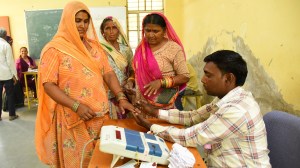- India
- International
Amendments to abortion law are welcome
For the amendments in abortion law to be effective, medical facilities need to be expanded and women have to be made aware of their rights.
 The 24-week modification will help a niche group of women who discover foetal abnormalities after 20 weeks or belong to defined vulnerable groups. (Illustration by C R Sasikumar)
The 24-week modification will help a niche group of women who discover foetal abnormalities after 20 weeks or belong to defined vulnerable groups. (Illustration by C R Sasikumar)
The proposed Bill seeking to amend the Medical Termination of Pregnancy Act (MTP, 1971) after nearly half a century is to be welcomed. Once enacted, the upper limit for terminating special kinds of pregnancies will go up from 20 weeks to 24 weeks — this is a recognition that certain physical and mental conditions can only be identified after the fifth and sixth month of pregnancy. This approach is in line with what seven other countries — Canada, China, the Netherlands, North Korea, Singapore, the United States, and Vietnam — follow. It is based on the yardstick of “foetal viability” — the capability of the foetus to live outside the mother’s womb. The 1971 law had forced vulnerable and traumatised women in an advanced stage of pregnancy to give birth to a compromised child or seek legal redress, an avoidable process that was fraught with delays and uncertainty.
The much bigger reason to commend the proposed amendment is its recognition that even unmarried women are entitled to seek legal abortion — as a right. But this brings to the fore several ground-level issues. First, the annual number of abortions in the country is massive — over 15 million, constituting 33 per cent of the total annual pregnancies in the country. Both in urban and rural areas, there is overwhelming reliance on medical termination (as opposed to surgical methods) by ingesting pills from a kit over one to three days.
In 2015, Lancet Global Health published a study, jointly conducted by researchers at the International Institute for Population Sciences (IIPS), Mumbai, the Population Council, New Delhi and the New York-based Guttmacher Institute, which showed that a whopping 81 per cent of women relied on medical termination.
Editorial | Amendments in abortion law give agency to women
The 24-week modification will help a niche group of women who discover foetal abnormalities after 20 weeks or belong to defined vulnerable groups. Such women have access to doctors. But there are concerns about those who have no access to doctors — millions of rural women who have never had access to a safe and transparent route to abortion. Victims of incest and rape have to resort to unsafe abortions to maintain secrecy and even married women become desperate to end an unwanted pregnancy for economic reasons.
Given the social and cultural milieu in the country, it is natural for women to rely on informal providers to access abortion pills. If these pills don’t work, the woman goes to or is taken to an unqualified practitioner who usually administers an oxytocin injection, performs a D&C (dilation and curettage) and advises consulting a doctor if bleeding persists. The doctor uses a suction apparatus to evacuate the uterus. But in rural areas, where are the doctors? The procedure costs anything between Rs 2,000 in peri-urban areas to around Rs 10,000 in cities. The distress of a woman from a rural area, who requires an abortion, can only be imagined.

Failure of contraception is a valid reason to seek termination of a pregnancy. But more than the failure of contraception, the major reason for unwanted pregnancies is inadequate information about the routes of dependable contraception and care. Most families in rural areas believe that sterilisation is the only solution to avoid pregnancy because in India, people do not have adequate knowledge and lack access to reversible methods like IUDs and injectables. Rural Indian women are far behind their counterparts in Bangladesh, Sri Lanka and Indonesia when it comes to awareness of these methods. State family planning departments place too much reliance on the village level workers, ASHAs, who provide condoms and pills to village homes. But there is documentary evidence that these condoms and pills are used only intermittently. After pregnancy, an unsafe abortion is often the way out — the third most important cause of maternal mortality. Availability of improved contraceptives and easy access to friendly and competent staff is a big gap which needs to be filled.
Opinion | Prachinkumar Ghodajkar writes: Amendments to Medical Termination of Pregnancy Act are a mixed bag
In urban areas, medical termination kits are available over the counter on prescription. In unorganised markets, it can be bought without a prescription much like several other Schedule H drugs. Are such over-the-counter sales permissible? Are prescriptions needed to purchase such drugs? There are conflicting responses to such questions from consumers — even those in Delhi. For consumers to understand their rights, an advisory in simple language must be displayed outside chemists’ shops.
Once the law permits abortion on demand, the service must be provided free in government-run facilities. Currently, there is a shortage of trained staff and inadequate supplies of both medical kits and suction apparatus in most PHCs. This must improve for the law to be effective. A directory of practitioners authorised to give prescriptions and undertake abortions at specified locations must also be freely available.
Next is the question of differentiating between two abortion-related laws. Entitlements under the existing MTP Act 1971 are much less known than the provisions of the sex selection law (PCPNDT). The two are often confused unnecessarily, exposing women to suspicion, questioning and patronisation. Once the law is amended, it will have to be explained in regional languages, and in a simple manner, to obviate the present state of ignorance, and hubris.
Opinion | Harikishan Sharma writes: Draft Bill proposes raising abortion upper limit to 24 weeks
The Constitution guarantees equal protection under law. Universal access to sexual and reproductive health is embedded in the charters of the International Conference on Population and Development,1994 and the SDGs. India is a signatory to both. Unless every woman in the reproductive age group has the ability to access what the proposed law intends it will remain only a good intention. Governments have enabled patients from remote villages to benefit from cataract operations and use institutional facilities for deliveries. Medical and surgical abortions must be handled in a similar way for women to be truly empowered.
This article first appeared in the print edition on February 10, 2020 under the title “Her right to choose.” The writer is former secretary, Department of AYUSH, government of India, and former chief secretary, government of Delhi
EXPRESS OPINION
More Explained
Apr 23: Latest News
- 01
- 02
- 03
- 04
- 05









































